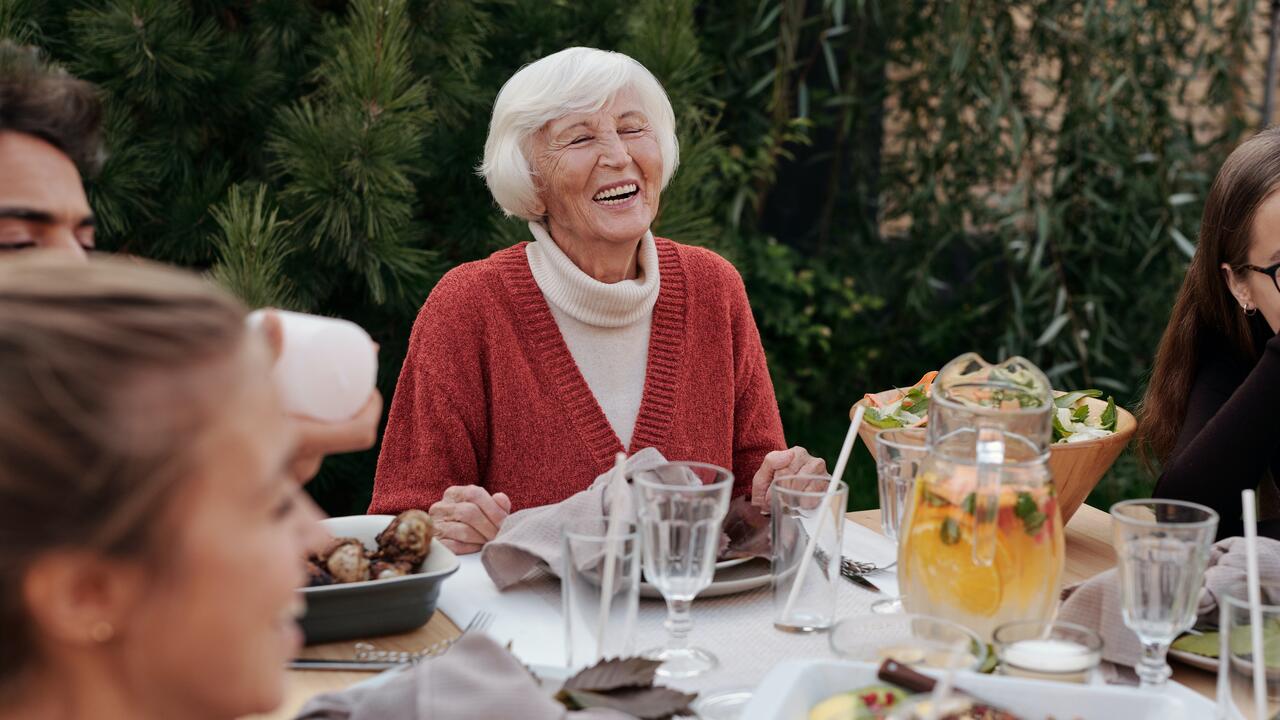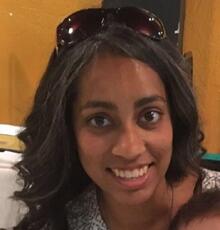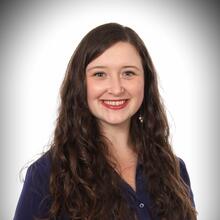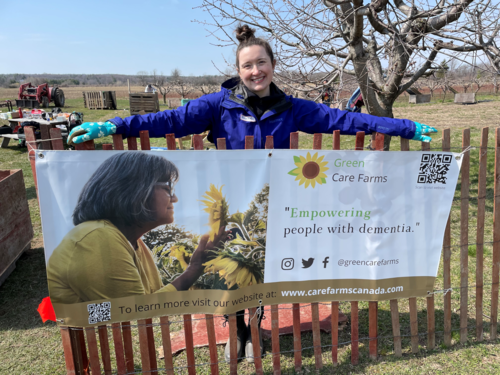
Career Perspectives: The rewards of working with seniors
Professionals working in senior care discuss why they chose this field, the challenges that come with it, and the respect they have for the people they care for

Professionals working in senior care discuss why they chose this field, the challenges that come with it, and the respect they have for the people they care for
By Rebekah Churchyard and Tiffany Moraes AlumniWelcome to Career Perspectives, where we share a conversation between two alumni working in similar fields.
In this conversation, two alumni discuss their experiences working in senior care. Tiffany Moraes (BA ’09) is a Therapeutic Recreation grad who has worked in senior living for 12 years. And Rebekah Churchyard (BA’ 13, BSW ’14), a grad in Social Development Studies, works in home and community care support services. She's also the founder of Green Care Farms, a program for people with dementia. Tiffany and Rebekah discuss how they ended up in this field, the challenges that come with it, and why they love working with seniors.
This conversation has been edited for length and clarity.

Tiffany Moraes (BA '09), Living Well Manager
Tiffany: I don’t know if I really got to learn more about you when we first chatted — about how you ended up in senior care.
Rebekah: Yeah, I’m a social worker by education and by training. I specialized in gerontology in school, and have always specialized in gerontology, or older people. I think I’ve been destined for seniors care since the very beginning. When I was a child, I would go home from church with older folks in our church, and I’ve always just felt drawn to older people. I volunteered when I was a teenager in a few different day programs, playing cards with people, doing some visiting services. Then I got some part-time jobs throughout university in long-term care, retirement homes — those sorts of roles.
We had the opportunity to specialize in our programs, so in my first degree in the social development program at Renison, I chose to specialize in gerontology and psychology. Then I did a BSW, a bachelor of social work, and finally in my master’s I chose the specialization of gerontology. What about you? What was your journey like to seniors care?
Tiffany: I can't say I always wanted to work with seniors, more because I don't think I realized the field was there. I was gung-ho on helping children or people with various needs, or even working with athletes. I took the therapeutic recreation and business double degree, and I didn't even know what I was going into to be quite honest with you.
I graduated, and like most people, I was like, “What do I do now?” I was in that stunned phase and I fell upon working in long-term care. I have a great-grandma, grandma and grandpa. It'd be like hanging out with them, but a lot more of them. That was 12 years ago. I've progressively moved from long-term care, to assisted living, to now retirement.
 Rebekah Churchyard (BA '13, BSW '14), CEO and Founder of Green Care Farms, Care Coordinator
Rebekah Churchyard (BA '13, BSW '14), CEO and Founder of Green Care Farms, Care Coordinator
The funny part is I am also an old soul. My family constantly tells me that we could be anywhere in the world and I will instantly make a friend with the senior, whether it'd be to start up a conversation or help them carry a bag. So, I definitely connect with them quite well.
Rebekah: Yeah, that's interesting. I forgot to mention my grandparents. So much of my motivation — I guess, sense of duty in a way too —came from my relationships with my grandparents. They lived on a farm and my grandpa was diagnosed with dementia quite young. So it was really interesting to go to school and learn about how health care and social care support somebody with dementia and their care partner.
My grandparents lived on a farm in a rural setting. So my grandma and I would email almost every day, about all kinds of stuff, but certainly what was going on with my grandpa and she had questions about things that I was learning. So the close relationship with them really motivated me as well.
Tiffany: So tell me, you work with seniors, what do you love about it? Or what's your favorite part about it?
Rebekah: I think in the earlier days, I had a lot of satisfaction of doing good assessments— having good clinical acumen, saying things that made sense, and having the right sort of charting or scores that would resonate with what they need (or what a system thinks they need).
I think now at this stage in my work, what I really like is being able to have a respectful engagement with the person across from me. It hopefully meets needs and wishes. I want to discern between what others think they might need and what they want for themselves. And that's a fundamental point of social work, right? To respond to the individual’s expressed needs and figure out how you can support them in achieving those aims. I like that I can have a respectful engagement with somebody and then I can share information — even if it's information they don't necessarily want to hear — in a way that is kind and consistent and informed. That's what I like the best, that relational piece.
Tiffany: Remind me what you do. Who do you do all this for?
Rebekah: I work for a level of provincial government where I do in-home assessments, usually for older adults who live in a triangle of concerns: polypharmacy (prescribed with a number of different medications), cognitive impairment and mood disorder or mental illness (history or newer onset).
So a lot of the people I see, they have a lot of pretty serious issues. A lot of the times they're quite stressed and family members are stressed, and there's a lot of confusing things happening with brain changes and their behavior. And that's why I like being able to respect them and still share information about what they need. Tell me more about your role, and what you like about it.
REBEKAH CHURCHYARD (BA '13, BSW '14), Care Coordinator and Founder of Green Care Farms
I want to discern between what others think they might need and what they want for themselves.
Tiffany: I work in retirement independent living as a living well manager. All the same role, just so many different names for it across the board. I essentially plan our residents’ monthly calendar, their day-to-day activities, fitness, excursions and events. I absolutely love it.
We have this misconception of what a senior is: they use a walker, they use a cane, they have to have white hair. They truth is, seniors are sometimes — most of the time — more fashionable than I am. I have a whole slew of them currently that have this purple shade in their hair because it's super trendy. Honestly, they are just like you and I, they just have a lot more years of experience than us and could tell us how to run the show.
That's what I love. You are chatting with them. You're laughing with them. I mean, they'll make crude jokes with you. It's just like talking to your friends. And, like I said, they have a lot more years on us and you can learn so much from them. For me, I really just enjoy what I do because of what I get from this.
Rebekah: Yeah, I couldn't agree more about the wisdom. I mean, one of the things that they teach you in life course theory, in gerontology, is the timing and sequence of events. So as any of us age, we're trying to figure out: “This thing happened to me at this point in my life. What does that mean?” And usually we're so busy experiencing it and living our lives, we don't have a lot of opportunity to reflect. But I think older adults have that special characteristic, the wisdom that comes with time. And they feel, in my experience, that they need to share it with you. You know, parenting tips or fashion tips, what's classic versus trend, there's all kinds of different pieces. And I couldn't agree with you more that they're just as diverse, funny, smart, observant as any other age.
TIFFANY MORAES (BA '09), Living Well Manager
It's just like talking to your friends. And, like I said, they have a lot more years on us, and you can learn so much from them.
Rebekah: I think one of the big challenges is bearing witness to what we call the cumulative loss. You probably came across this as well in your studies — it’s when you have multiple different types of loss as an older person. Changes in health care, your social situation. If your friends or family passed away, changes in your ability to do things. I think it can be very rewarding for someone to reflect back on their life and their accomplishments and their achievements. But it is a little sad too. It's hard to observe that, to bear witness to that with people sometimes.
Tiffany: Absolutely. This goes back to that whole wisdom piece. What do you say to someone who just recently lost their spouse, or their child? They've probably been through this so many times and all you can do is console and comfort. You're not there to provide anything more, and it's sometimes tough because you want to do everything you can to make them feel better.
I think another challenge in the field: we are seeing loss in numbers of employees. Unfortunately, and this is a systemic issue, it’s not a big paycheck that you get when working on the frontlines. At some point, working with seniors and the passion you get from your day-to-day, unfortunately doesn’t outweigh the amount of work that you're doing.
I am not sure how it's going to change but there are a lot of special people out there who will deal with that challenge. At the end of the day, they get to go home and they get some contentedness. They feel good about what they did for the day. For them, that happiness balances out the paycheck, in a sense. I mean, you need what you need, but it balances it out to make your personal stress level low, which can help a lot mentally.
Rebekah: Definitely. I remember thinking earlier, when I was starting my career: “Well, that's so sad.” Because a lot of older people, they die, and I thought, “Oh, that's so sad.”
But it's an extremely natural thing — as natural as birth is, so is then death right? I think one of the most rewarding things you can have as a professional in the in this sector is bearing witness to someone as they're living some of their last days. Having those conversations about, you know, what were the nuggets for you? What were the things that make life worth living? It really is an extraordinary honor to be with someone when they're in that stage. And most of my clients, they feel peace with it. It’s a really nice, special place. It's not all bad. It actually resolves something in me.
REBEKAH CHURCHYARD (BA '13, BSW '14), Care Coordinator and Founder of Green Care Farms
I think one of the most rewarding things you can have as a professional in this sector is bearing witness to someone as they're living some of their last days.
Rebekah: I learned so much — I'm sure you did too — about the different levels of government. Municipal, provincial, federal — they all have their own responsibilities. One of the difficulties right now when it comes to streaming funding at a provincial level is that we don't have a healthcare arm that encompasses seniors. They're very much focused on the body parts. So you have arm specialty, legs specialty, head specialty. You don't have a seniors care stream in itself, which makes it difficult to focus on that as a social and healthcare issue.
So, what does government do at different levels? It does different things for seniors at all different levels. So you've got different designations for financial options, pensions, related things like that. For seniors, you also have different options for health care, like depending on their issue, and housing. So all of the big things are spread for all of us, but I think especially for seniors. It can be hard to navigate.
Tiffany: Oh, absolutely. I mean, I'm currently having an issue with transportation. And, I mean, housing is a huge issue. Just understanding the senior living industry.
I hate to go back to COVID again, but I didn't actually realize how different parts of each government reflect back on us. Some will say one thing, but this part can say another. And one doesn't talk to the other. It's a huge minefield to understand and have a really fantastic advocate for all of us at the top.
Rebekah: When thinking about what a good career is to join, I considered what sectors are going to be growing or booming, what type of industry is going to have good traction for a career. Some roles certainly don't pay a lot, but there's a lot of opportunity for growth when it comes to seniors care. People are living longer than they ever have before, right? Blown past 100 and still doing all kinds of things. So longevity is increasing, our aging population is growing. Folks who enter senior care will have a job for a very long time, should they choose to stay in that sector. I don't know what your thoughts are on that point?
Tiffany: You’re absolutely right. During the pandemic, while everybody was working from home or unfortunately getting laid off, I went into work for 365 days of the year. Because we couldn't just leave all our seniors here and work from home. It’s definitely is growing. It's still growing. We haven't even touched the boomers.
Rebekah: I mean, there are so many opportunities. I think, probably what always resonates with me when I’m talking to students, and then mentoring, is just that we need all the ideas. We need all the passion and the smart thinking. We need it all for this sector.
Tiffany: There is no bad idea. That is absolutely true.
TIFFANY MORAES (BA '09), Living Well Manager
It's definitely growing. It's still growing. We haven't even touched the boomers.
Rebekah: Yeah, no bad idea. There's enough of a population segment, there's enough of a market for everything to at least be tried and tested. And we certainly need more people in it. Similar to what you're saying before, a lot of my colleagues went into fields with children and that was very much what they were focused on. They knew from day-one, I'm interested in kids and working with kids, supporting kids. Kids are lovely, nothing against children. I love children too. But not as many people think that way about older adults. And I think that's a lot of the stigma we're still working on, even though you and I know that older folks are great. Many best friends that are older people.
Tiffany: That’s very true. We don't think about them the same way that we would think about children, and it's not to make them synonymous. It's just more to understand that there are a generation of people just like children and teenagers and adults. And they have needs and wants just like you and I.
Rebekah: So it's a safe place to work and because there's so many people and opportunities.
Tiffany: Oh yeah. And it’s definitely more fun than most people know.
Rebekah: Yeah, like you can have literally any career you could have and then specialize in seniors, whatever it is. You could teach, you could do health care, you could do finance, you could do law. Tons of jobs there….
Tiffany: So I know we both have a bit of a business background. Care to share?
Rebekah: Sure. I do have a company, Green Care Farms, and it’s a social enterprise that provides an operational day program for people with dementia on a farm. There are thousands of this type of care model across Europe, particularly in the Netherlands. When my grandpa was going through his journey, we were trying to find appropriate programs for him, and we really struggled to find something that was nature-based, focused on outdoor engagement. Because he was an outdoors person, very much dedicated to nature and being outside, he didn't really like a lot of the indoor programs. So when I learned about this care model, I thought, “How can I make this happen in Canada?” And the most effective way so far, I think, has been to start a business.

We had our first year of operation this summer. Probably my number-one gripe with social work is why don't we have accounting classes? We need a finance class. I remember so many social workers [saying], “I'm in social work, I don't do math.” Guess what: you probably will need to do math in some way, shape or form if you are in social work, whether that's budgeting or having financial discussions with people — whatever.
I didn't mention this before — I started out in a dual major, business and social work program. I took microeconomics and was terrified. So I dropped it. Dropped the double major and then came full circle after school. I wish I had stuck it out. I didn't. So, I took project management professional training. I took three courses before I wrote my Project Management Professional designation. That gave me enough business acumen to start the business. What about you?
Tiffany: So, I started with the double major. I did stick out microeconomics — it might have been macro. We had the choice.
Rebekah: Well done.
Tiffany: And I finished with the double degree. So business and therapeutic recreation, and that business portion absolutely gave you a different outlook on your day-to-day job. So yes, you're completely focused on your residents, or your clients, or whoever you're dealing with. But you also can see the business aspect of it, and how your actions can actually impact the business as a whole. To some people it's not interesting. To me, that was completely interesting because my family had a small business as well that I helped with, so it gave me a look at the other side.
I actually just graduated in July from my MBA. I used all the downtime during COVID to create a higher education opportunity. So with that, I'm not really sure what's happening next. I always have a nice business idea in the back of my mind. And like I said, I do really enjoy what I do. So who knows, maybe I'll stay here and do something else on the side. Really, I have no clue at the moment, but I think that's where everybody is when they graduate from any program — undergrad, high school, higher education. And I think I've come to the terms that that's quite normal.

Read more
HR professionals discuss working in tech, the power of your personal network and the value of an arts degree

Read more
Rahim Thawer (BA '08) shares the student experiences that led him to a career in social work

Read more
Freelance entrepreneurs discuss how they grew their client list, the struggle to set prices and why they build personal connections in their networks
The University of Waterloo acknowledges that much of our work takes place on the traditional territory of the Neutral, Anishinaabeg, and Haudenosaunee peoples. Our main campus is situated on the Haldimand Tract, the land granted to the Six Nations that includes six miles on each side of the Grand River. Our active work toward reconciliation takes place across our campuses through research, learning, teaching, and community building, and is co-ordinated within the Office of Indigenous Relations.